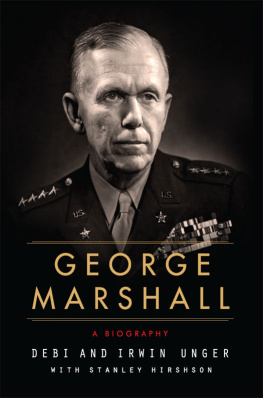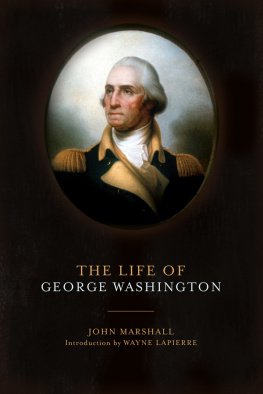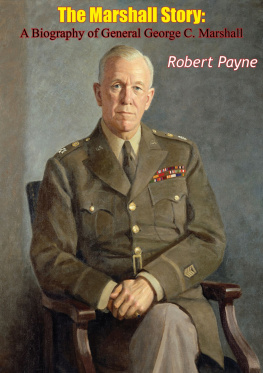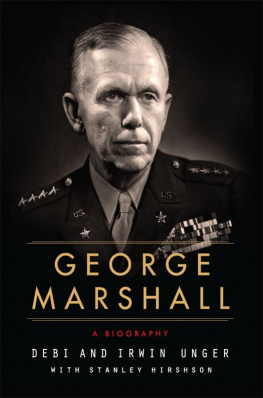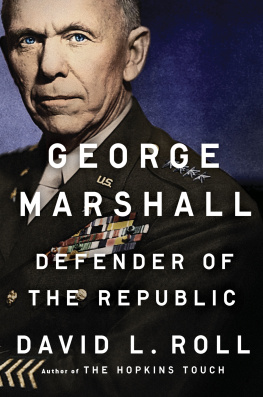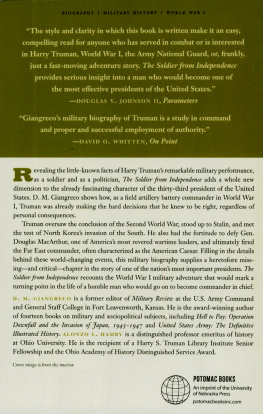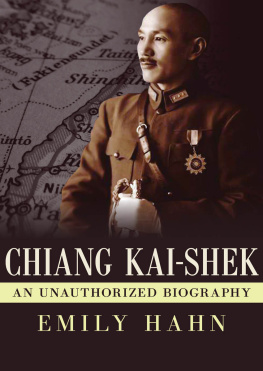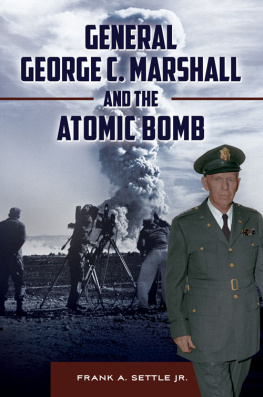


To Elian with love

CONTENTS



George Catlett Marshall was born on the last day of 1880 between two worlds. His birthplace was Uniontown, Pennsylvania, a grimy industrial town fast becoming the coke capital of America. Georges father was a coke baron, a man who converted bituminous coal into a high-carbon ash used in blast furnaces for reducing ore to metallic iron. For a time George Senior rode the growth wave that transformed America into the worlds manufacturing powerhouse. Yet in Georges boyhood Uniontown was still geographically and culturally close to the rural countryside. His earliest memory was climbing up a ladder in the family barn, where the Marshalls kept a horse and a cow, to get a haymow, a piece of farm equipment. George indulged fully in the boyhood pleasures of nineteenth-century rural life. He never enjoyed cities and in later years would regret what industry had done to his hometown.
There was an even more significant divide in Georges youth and childhood. His parents represented a tradition at odds with the texture of life in southwestern Pennsylvania. Though both his fathers family, the Marshalls, and his mothers, the Bradfords, had long resided in Kentucky, they traced their ancestry to Virginia. That pattern was not uncommon; hordes of old-stock Americans could claim Virginia origins, for the Old Dominion had scattered thousands of its sons and daughters across the nations landscape to merge and blend with streams of people from other commonwealths and other countries. Yet many of these Virginians, wherever they lived, held themselves special for their ancestry and their ancestral values.
The proud claim was based in part on a myth of royalist forebears fleeing Oliver Cromwells Puritan England. These high-toned Cavaliers had fought for King Charles I and fled Britain for America in the 1640s, when Cromwells low-born Roundheads triumphed and beheaded their monarch. In fact few English royalists actually sought refuge in the infant colony named for the Virgin Queen, Elizabeth I; far more Puritan Roundheads settled in frigid New England. Yet the legend of Virginias Cavalier heritage, reinforced by the century-long struggle between North and South over slavery and states rights, would prove potent as a formative cultural influence among its children, whether at home or abroad.
One result was inflated collective pride, as expressed by the lineage society the Order of the First Families of Virginia (FFV), a state version of the Daughters of the American Revolution (DAR) or the Sons of the American Revolution (SAR). The full myth went beyond the Cavalier-Roundhead distinction, however. More legitimately, it also drew on the critical role of Virginia in the events leading to the Revolution, and on the fame of its revolutionary sonsWashington, Jefferson, Madisonin the creation of the early republic. For Georges family the esteemed forebear was John Marshall, the fourth chief justice of the U.S. Supreme Court, who established judicial supremacy as the cornerstone of American constitutional practice.
Though at best a distant, collateral relation, the famous jurist loomed large in Marshalls family lore. George Catlett Senior revered John Marshall and treasured his connection to the chief justice. However, as a boy his younger son never had much use for the puffed-up family pride that infused his father. In fact he believed that continual harping on the name of John Marshall was a kind of poor business. George at one point offended his father when, thumbing through a history of the Marshall family, he fastened on the pirate Blackbeard, husband of one of the ancestral Marshall women, as the only interesting character in the work, and boasted to his classmates about his raffish forebear.
But if indifferent to his own pedigree, George was susceptible to the Virginia myth as a force for molding character and personality. In reality, from the outset, the settlers of colonial Virginia and their descendants enjoyed a mixed reputation, one that included proclivities for hard drinking, boisterous sports, reckless gambling, and heedless extravagance. But at its best the ideal of Virginian shaped a code of values and behavior that appended pride with honor, grace, and integrity that George somehow absorbed on the road to adulthood. Among those who seriously practiced what they preached, it included a love of place and country, an exalted standard of personal honor and public rectitude, an avoidance of overt self-serving, and a respect for women, children, and the weak. Alas, in Georges case, it also discounted humor. Many people had words of high praise for Marshall over the years, but few ever called him funny. Years later, when he presided over his countrys military operations in the greatest war in history, a colleague in the War Department recalled his manner of giving orders. He was a demanding man, an aide, Col. Frank McCarthy, later told an interviewer. There was nothing except, Take this and Do this and so on, and Yes sir.... Never with humor, never with warmth, but with correctness and politeness. Few of the published pictures of Marshall show him with a smile on his face.
For George as a boy the Virginian myth was steeped in the special mystique of George Washington. Close to his Uniontown home was Fort Necessity, where in 1754 the French had defeated the young lieutenant colonel of the Virginia militia sent to oust them during what became a dress rehearsal for the French and Indian War. When George Junior was seven his father took him on a memorable tour of the fort, then in ruins. In 1957, in his first interviews with his biographer Forrest Pogue, Marshall seemed almost obsessed with Washington and his early military exploits. It is not surprising that as he evolved into an adult George would borrow the attributes of his childhood hero and make them his own.
Interestingly, Washingtons own self-creation had foreshadowed Georges. According to his recent biographer Ron Chernow, the Father of His Country tended his image with extreme care. He trained himself to play the gentleman in polite drawing rooms.... People sensed something a bit studied about his behavior. Chernow says that Washingtons model was the British aristocracy as he perceived it before the Revolution, but Marshall in his turn learned much of what manhood meant, or should mean, from Washington directly. One telling instance of imitation was Marshalls devotion to horseback riding. The first president was famous for his superb horsemanship, and it appears likely that Marshalls almost compulsive attachment to riding was inspired by his great predecessor.
Marshalls exposure to noble Virginians and their attributes intensified at Virginia Military Institute, where George would receive his military training as a young man. At VMI in Marshalls day the Civil War victories of Confederate general Thomas Stonewall Jackson in the Valley Campaign, at Antietam, and at Fredericksburg remained heroic legends. His classmates at the institute, moreover, were predominantly Southerners, many from the wealthier classes who cherished and emulated the Virginia type. Reinforcement came from that still-more-famous Virginia general, Robert E. Lee, the commander of the Army of Northern Virginia and general in chief of the Confederate army. After the Souths surrender at Appomattox in 1865 Lee had settled in Lexington, adjacent to VMI, to serve as president of Washington College. He was a potent presence, both literally and figuratively, in Marshalls early manhood.
Next page
